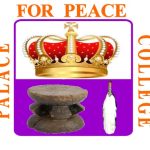
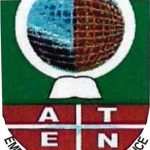
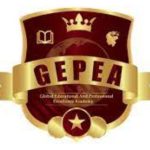
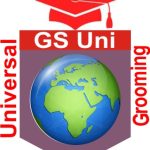
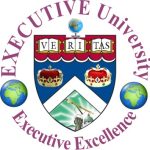
PALACE FOR PEACE COLLEGE
(Global Grooming For Peace)
The pivotal importance and relevance of Royal Fathers in all spectrum of human affairs is key to our development. Their positions behind the scene in each succeeding tiers of government is a ladder of success. It is a tear of grief as often times, they are relegated to the background as armed chair critics. In the primitive society, Royal Traditional Rulers performed the functions of the three arms of government (Legislature, Executive and Judiciary). In the digital age, the tempo is a bit different in several quarters around the globe. As a custodian of cultural heritage and reservoir of wisdom and knowledge that has transversed the lines of history; the need for sustainability is due. The ethos, morale, societal ideal and customs call for the urgent need for resuscitation and right side up. The need to fine-tune and re-orientate their relevance is praise worthy. To this end, PPC is equipped to provide a fertile ground for their empowerment in training and re-training for upward growth vis-à-vis Sustainable Development Goals, UNESCO and UNO development goals in the digital climate.
ORGANIZATION
PPC programmes are designed to help you:
Re-think the way you do community or organization by giving you a new critical and analytical thinking tools to effectively address the leadership-needy areas of your community or organization.
Re-focus on calling for your life and organization to align them with your core values and best gifts with goal of greater effectiveness and impact in your choice within your terrain.
Re-tool with the advanced visoneering leadership and management skills that provide new ways of addressing organization for greater impact and effectiveness. Renew your passion for a healthy holistic and balanced approach to academic discipline, and your personal relationship across functions. Re-orient your perspective with a global and prophetic focus on reaching the global world with word changing and spirit-led influence and impact. Re-sharpen your community perspectives on the core areas of values, strategy, peace building, cohesion, comradeship and development. PPC is superbly organized in the following categories:
ROYAL COLLEGE OF CHIEFS
MEMBERSHIPS
- Prestigious Peace Dynasty (PPD)
PPD is prestigious forums aptly meant for the highest Traditional Tribal Monarchs who in most cases act as a voice for their tribe on issues that relate to community ideals, cultural values and community stability and peace. Their Accolade is often His Royal Majesty.
- Palace of Peace Majesty (PPM)
PPM is meant for All First Class Chiefs in a given community or kingdom. They are often under the Tribal Head Leadership and work towards the promotability of cultural values and ideals. Their Accolade is often designated as His Royal Highness.
- Royal Peace Builders (RPB)
RPB is reserved for All Second and Third Class Chiefs within a given community in a State or Region. They serve as immediate voice of the community they represent and alert the Monarch of issues that concern their various communities. They could be called whistle blowers for peace, equity and stability.
- Traditional Heritage for Peace (THP)
THP are the ungraded Chiefs who serve as supporters in the promotion of cultural values. They are not in the pay roll of the government and often not officially recognized by the government. They offer voluntary services to their immediate communities and relate closely with second class or third class chiefs.
- Peace and Development Frontliners (PDF)
PDF are community pillars and frontiers who have carved out a niche for themselves over the decades. They are the illustrious Sons and Daughters of the kingdom, Moguls and Icons in their lands. They are often Awarded and Crowned with Honorary title for their staggering Qualities and Supports.
- Promoters of Peace (PP)
PP is meant for Capable Folks who have contributed immensely to the promotion of Peace, Artistic values in their immediate communities. They are often times occupy a hidden role.
- Palace for Peace College (PPC)
PPC offers manpower development Seminars, Tutorials, Coaching, Mentoring, Peer Group Workshops, Zoom meeting, Conference, Webinar, training and re-training to keep them a floating in their enviable roles as custodians of culture and peace builders and development.
Honors and Awards are offered with incentives to foster their good works towards the enhancement of peace, cultural values and sustenance of democracy.
SENIOR CONSULTANTS AND CONSULTANTS
- All Monarchs & Tribal Heads
- Technocrats
- Top Legal Luminaries
- Industrialists
- Ivory Towers
- Policy Makers
- Top Religious Leaders
- Human Right Activists
- Civil Society Organizatins
- Heads of NGOs
REGISTRATION
PPC is Registered with Institute of Total Quality Service Measurement (ITQSM), Portugal, Global Seminary University, eSkillGrow Virtual University, India and Africa Theological Education Network, (Corporate Affairs Commission, Abuja, Nigeria) and GEPEA University, Lisbon, Portugal, Europe and IAMA International Open University of Florida, USA
A KEYNOTE ON CULTURAL AND LEADERSHIP WORLD VIEW
The publication of the UNESCO World Report Investing in Cultural Diversity and Intercultural Dialogue is particularly timely in light of the current world events. The financial crisis and its consequences for the economy, labour markets, social policies and international cooperation risk to show that culture often remains the first variable to be scarified when drying up of financial resources imposes a drastic choice between a number of competing priorities. Yet this is a very short-term view. For at this crossroad, where some are urging us to think in terms of a new world in which human disasters of this kind would no longer be possible, greater acknowledgement of cultural diversity is proving a particularly promising avenue of approach. This World Report seeks to show that acknowledging cultural diversity helps to renew the international community’s strategies in a series of areas so as to further its ambitions objectives, with the support and involvement of local populations. For culture is not simply another sector of activity, a mass consumption product or an asset to be preserved. Culture is the very substratum of all human activities, which derive their meaning and value from it. This is why the recognition of cultural diversity can help to ensure that ownership of development and peace initiatives is vested in the populations concerned. With regard to development initiatives, it has long been known that their success depends significantly on the extent to which they incorporate the cultural factor. But the message of sustainable development is that the planet is essentially finite, and that the resources humanity hoped to discover in its environment must now be found within itself, in ts very diversity. Diversity must henceforth be considered a starting point rather than an obstacle to be overcome. Cultural diversity invites us to think in terms of a plural humanity, embodying a creative potential that precludes any prescribed model of development. With regard to peace, we are convinced that its sustainability depends upon universally proclaimed human rights, which are the main token of our common humanity. The acknowledgement of cultural diversity and intercultural dialogue help to defuse the tensions that can arise in multicultural societies when a majority and minorities confront each other over recognition of their rights. What favours cultural diversity, which is ¡n no way opposed to the universality of human rights, is a governance of reconciliation, which is the surest guarantee of peace.
Read More
This approach has a bearing on international reflection on the ‘post-crisis’ world and the new mechanisms needed for its construction. While the traditional cultural sectors (such as book sales or cinema, theatre, and concert attendance) seem for the moment to be spared by the ‘crisis’, ¡t is worth underlining that culture can serve as an ‘anti-crisis’ weapon by encouraging us to think in terms of alternative modes of development. In this connection, it should not be overlooked that economic actors are increasingly acknowledging the importance of cultural diversity, not only in public policy — with regard to education, languages, media content and the arts and culture — but also in the activities of the private sector. We are witnessing the rediscovery of the virtues of a diversity work environment, in which creativity and innovation derive less from competition than from mutual receptïveness, from the sharing and exchange of knowledge. New areas of encounter between public and private decision-makers are emerging and UNESCO has a leading role to play in this regard. Hence, Palace For Peace College (An Arm of Executive University) has a bi-polar movements to stand between and betwixt the Community and the Government to enthrone peace.
To this end, the need to bring on board and honour the image bearers and champions of our cultural heritage is given wide acclaim. Indeed, our International Directors in USA, U.K, India, Portugal, Saudi-Abia and some Universities around the globe ¡n collaboration with Universal Peace Federation, have reached a consensus on the need to honour some individuals at both local and national levels who have contributed immensely to local and world peace. Hence the emergence of this Honour with regard to our Royal Fathers and some Dignitaries.
This Award seeks to recognize and honour traditional rulers or community leaders and all classes of people who have committed themselves to promote development within their respectful domains through social work and selfless leadership across functions.
The nominee must have demonstrated significant achievements in building inclusive communities, conflicts prevention, conflict resolution and reconciliation. This Award recognizes and honours individuals and organizations that continually make exemplary commitment and outstanding contributions to the pursuit of peace, justice building, institutional development while championing the capacity of humanity to live ¡n harmonious adjustment with one another.
A genuine acknowledgment of cultural diversity is thus essential to attain the Sustainable Development Goals. The belated recognition of this truth at the 2005 World Summit must now be translated into practical action. .
Campaigning for the acknowledgement of cultural diversity in fields not immediately identified with culture does not mean lessening our vigilance in the cultural field proper. Safeguarding our tangible and intangible heritage, stimulating creativity and furthering the discovery of new cultural horizons will necessarily remain formidable challenge. While such goals may be seen by some as a pointless luxury, the preponderance of evidence and majority of reputable minds attest to the fact that Awards have a driven mechanism for greater input and output for profitability, development and the preservation of a sane society. Sound Culture and Leadership are necessary variables for growth. They are inter-twined, inter-dependent, inter-continental and mutually inclusive.
Primate Professor Mayor Noah Raimi Yakubu, Professor of Global Security and Peace Studies, Crown University, Argentina, USA.
UNO Mayor for Peace, UNESCO Diplomat, Security Architecture Icon & Archbishop, Universal College of Bishops and Overseers (UCBO), Visioner & Visitor, Palace for Peace College.
PICTURE OF SOME STAKEHOLDERS

Some Honorees in the Global Fora

Key Faculty Team Around the Globe


It is my pleasure and privilege to welcome you on the family train of Palace For Peace College (PPC). PCC is in collaboration with several Universities and Organizations around the globe for collegiality and empowerment. It is a family of Traditional Rulers with proven integrity. PPC is an engine room for training and re-training of Royal Rulers and other Dignitaries both locally and globally. It is a family of building Synergy across functions with global mandate. The gain of being a Client in PPC is enormous. It is hoped PPC will take you to the next level of development as we welcome you on board.
Yours locally & Globally.
Prof Sir Bikash Sharma (KR), President


























